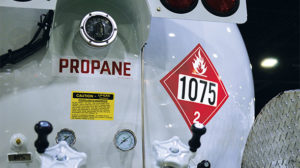Designing a DOT security plan for your operation
Did you know that the Department of Transportation (DOT) Code of Federal Regulations (49 CFR 172.802) requires all propane marketers that transport hazmat to have a written security plan?
A DOT security plan is critical in evaluating security risks, preventing unauthorized access and ensuring that your employees are properly trained to take action in the event of a security breach.
Q: Who is required to have a DOT security plan?
A: Companies that operate propane cargo tank motor vehicles with a water capacity greater than 792 gallons (like a bobtail) must have a written security plan to meet specific DOT regulations. So, if you are a propane marketer, you most likely need a security plan.
Q: Are there training requirements for DOT security plans?
A: Yes. All employees who perform tasks subject to hazardous materials regulations are required to complete DOT hazmat training. This includes customer service representatives, delivery drivers and service technicians. DOT security plan training must be completed every three years.
Q: Does my company’s security plan need to be reviewed?
A: Yes. Written DOT security plans must be reviewed at least annually and revised or updated as necessary to reflect changing circumstances.
Q: I am not sure if I have a security plan or that the plan I have is up to date. What can I do?
A: Reach out to a safety professional to get started on your DOT security plan. If you already have one in place, it is a good idea to have it reviewed by a safety professional. They can assess your plan, identify any areas that require updates or revisions and conduct required security plan training with your employees.
Having a written plan is crucial to meeting important DOT requirements. Your security plan will help to promote a safe work environment, avoid costly fines and protect your company from risk or litigation.
*Featured photo by Joe McCarthy
Jerry Schimmel is the vice president of P3 Propane Safety and P3 Duty to Warn.

















